Community Colleges Staff Chemung Construction Jobs
BY AsphaltPro Staff

Ed Dalrymple Jr. said he always knew that he would join the family business, Dalrymple Construction Companies, Pine City, New York. Today, he serves as president and fourth generation of leadership within the family-owned business.
Dalrymple’s father brought him up in the business, which was founded in 1902. Originally a construction materials supply company, the company later expanded into manufacturing ready-mix concrete and later, asphalt.
Their first asphalt plant opened in Elmira, New York, in the mid-1950s—around the same time the company began placing asphalt—and additional plants were opened in Seneca Falls, New York, in the ‘70s. During the cold winter months, Dalrymple’s construction subsidiary, Chemung Contracting, would migrate to Virginia to extend its construction season.
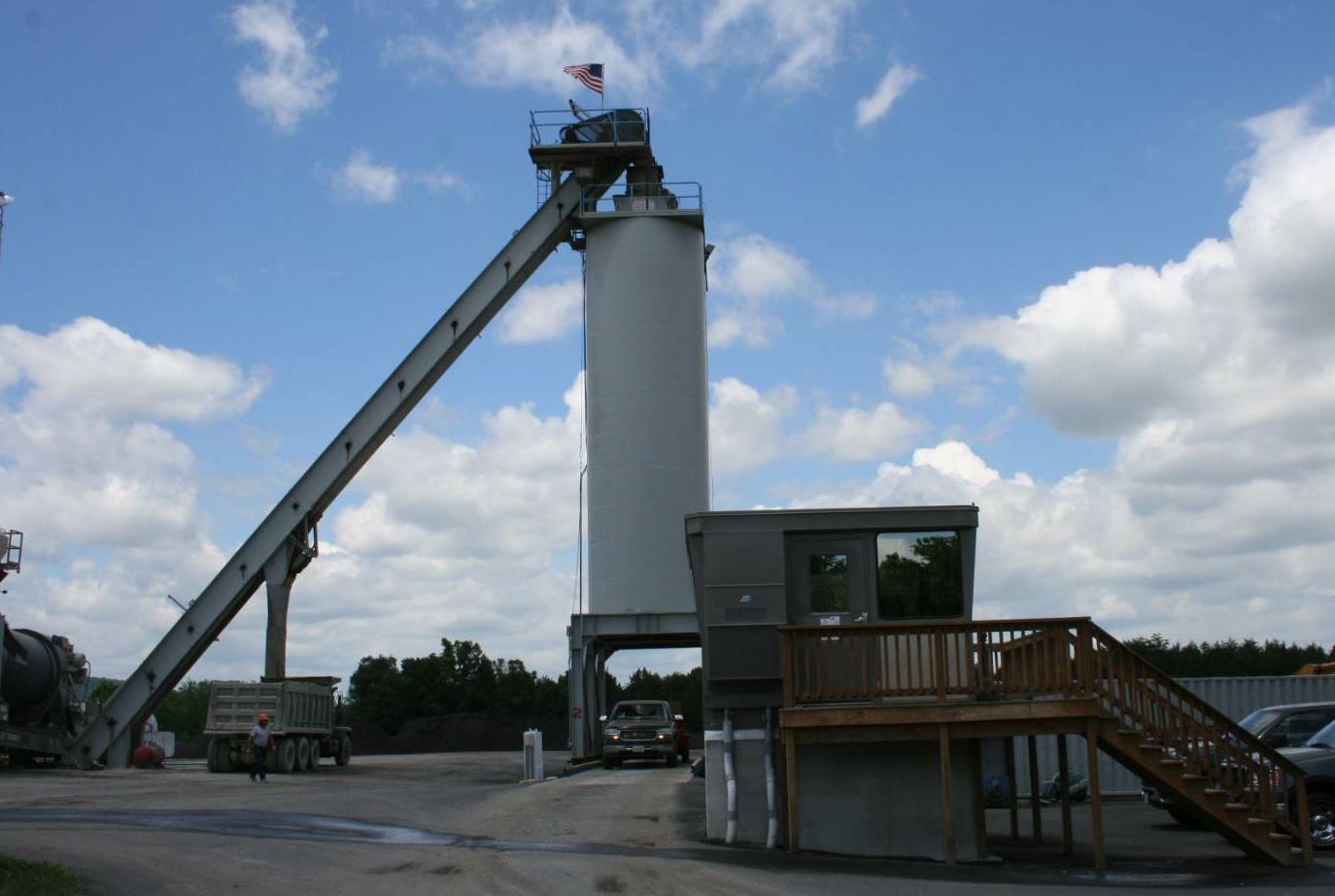
Chemung’s asphalt plant in Culpeper is a Terex counterflow plant producing 300 tons per hour.
By the late 1990’s, the company had established two additional asphalt plants, in Culpeper and Gainesville, Virginia, to supply their regional asphalt paving operations.
Today, the company focuses on manufacturing aggregates and asphalt, as well as large asphalt paving projects and DOT maintenance paving. Dalrymple estimates that around 25 percent of the company’s asphalt paving is airport work, 5 percent is private, and the rest is DOT and municipal work.
The four plants produced around half a million tons of asphalt in 2017, three quarters of which was laid by the company’s own crews.

Dalrymple’s cousin, Hank Dalrymple, runs the operations in New York, and Dalrymple leads operations in Virginia, each of which employ around 125 people.
Dalrymple’s son also works for the company, as does his grandson, who would be the fifth and sixth generation of Dalrymples at the helm.
“In Virginia, like in most places, we have an aging workforce,” Dalrymple said. Some of the company’s plant operators and other employees are in their 70s. “We knew we needed to do something to build ourselves a new workforce.”

Germanna Community College is not only a partner in the workforce development project with Chemung, but it is also involved in the Virginia Department of Transportation’s certification program, or VECAT, shown here.
That’s why Chemung teamed up with Germanna Community College, Culpeper, Virginia, to develop an apprenticeship program for new talent.
The program works something like this: A student works full-time for Chemung, or one of the program’s other corporate partners, on the company’s paving crew, in its asphalt plant, or in the lab. Meanwhile, they also attend courses at Germanna part-time that are paid for by Chemung.
“It’s a little bit selective,” said Carter Iseman, Director of Training and Development for the Virginia Asphalt Association, Richmond, Virginia. “A company has to see the willingness, promise and staying power of the employee.”

Most of Chemung’s asphalt paving projects are DOT maintenance paving. Dalrymple estimates that around 25 percent of the company’s asphalt paving is airport work, 5 percent is private, and the rest is DOT and municipal work.
Currently, two companies are involved in the apprenticeship program as sponsors: Chemung, and Branscome Inc., Williamsburg, Virginia, although Iseman expects to add more participating companies over time.
The Department of Labor works with the sponsoring company to set the track and put together the curriculum based on local in-person and online classes.
The program can also be personalized to suit the apprentice’s interests and goals. For example, a student who wants to be a mechanic will be able to follow a diesel mechanic track, whereas someone who wants to work in the lab would follow an asphalt technician track.
The program lasts a minimum of two years to complete, but Iseman said it is more commonly done in four.
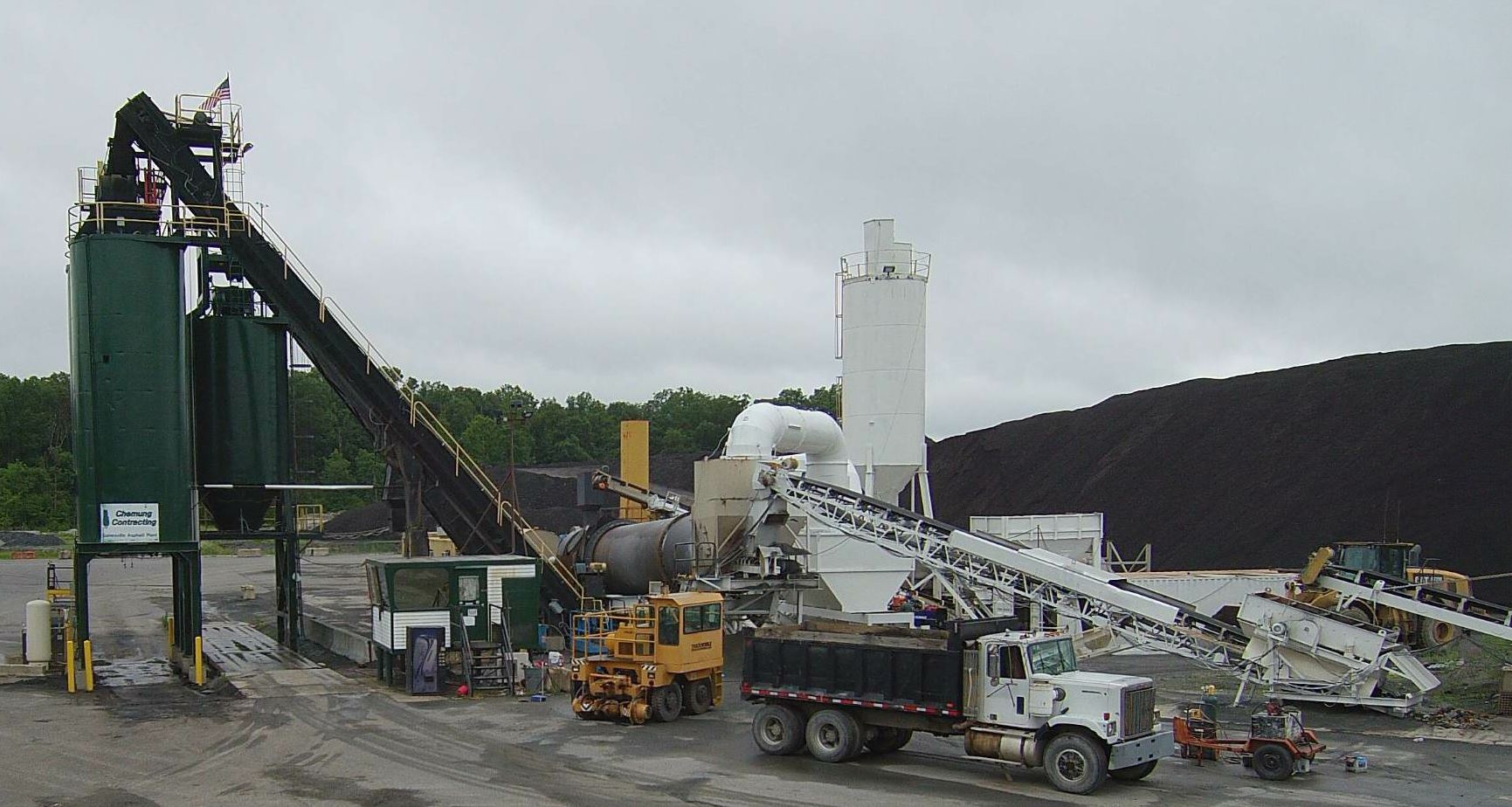
Chemung’s Gainesville plant is a CMI counterflow with a Gencor drum, producing 250 tph. In addition to its Gainesville and Culpeper plants, Chemung also has two plants in Seneca Falls, New York, including a Barber Green parallel flow drum plant (250 tph) and a Cedar Rapids batch plant (200 tph).
When the student graduates with an associate’s degree, they can choose to continue to work for their sponsor full-time, transfer those credits to a four-year institution, or do something else entirely. They would also earn a journeyman’s card certifying that they are proficient in asphalt technology.
“Our hope is that they continue to work for us after they complete the program,” Dalrymple said, though they are under to commitment to do so. “We have a lot of people who’ve worked for us their whole lives, and families who’ve worked for us for three generations. Hopefully [the students] will see what they see.”
Chemung began the program four years ago, and their first apprentice has just received his journeyman’s license. They currently have eight employees enrolled in the program.
Potential participants are interviewed both by Germanna and the sponsoring company and must work 90 days to ensure they are a good fit for this type of work. If they are, they can begin the program.

Germanna Community College is not only a partner in the workforce development project with Chemung, but it is also involved in the Virginia Department of Transportation’s certification program, or VECAT, shown here.
One trend Dalrymple has noticed in his company’s experience is that the average age of this group is around 30. “We see people who’ve retired from military service and people switching careers, and we’re able to train them and put them to work right away,” he said.
However, Dalrymple plans for the apprentices to visit local high schools to talk about the program.

In fact, VAA just started a program in the Richmond area to generate interest in the asphalt industry among high school students.
“We did info sessions, but we tried to make it fun, like show a quarry blast, share cool road facts, and talk about the benefits of earning a paycheck,” Iseman said. From those conversations, three students later began the apprenticeship program.
“We want these students to know that they can get a degree debt-free while making an average wage of $45,000,” Dalrymple said. Over time, he said, that can increase to $85,000 to $100,000.
“It’s a great way to bring people into our industry,” Iseman said. “If they stick with it and make a career, they could be running a company one day.”
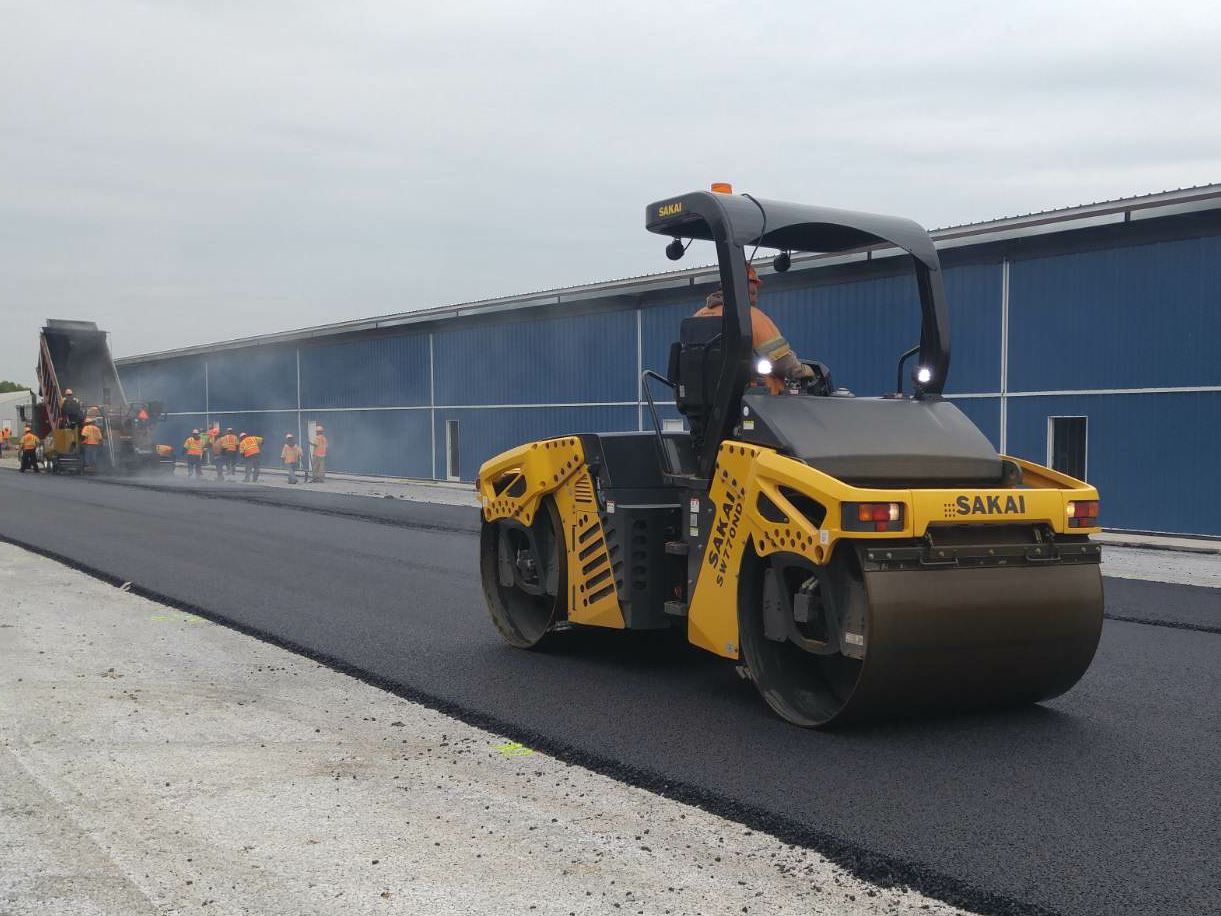
Recently, Chemung constructed executive hangers at Culpeper Airport. In front of the hangers, Chemung placed a foot of No. 1 stone, cement-treated No. 57 stone, and two courses of porous asphalt pavement, IM-19mm and a 12.5mm for the final surface course. The Culpeper Airport porous pavement project won a Green Award from the Virginia Asphalt Association .
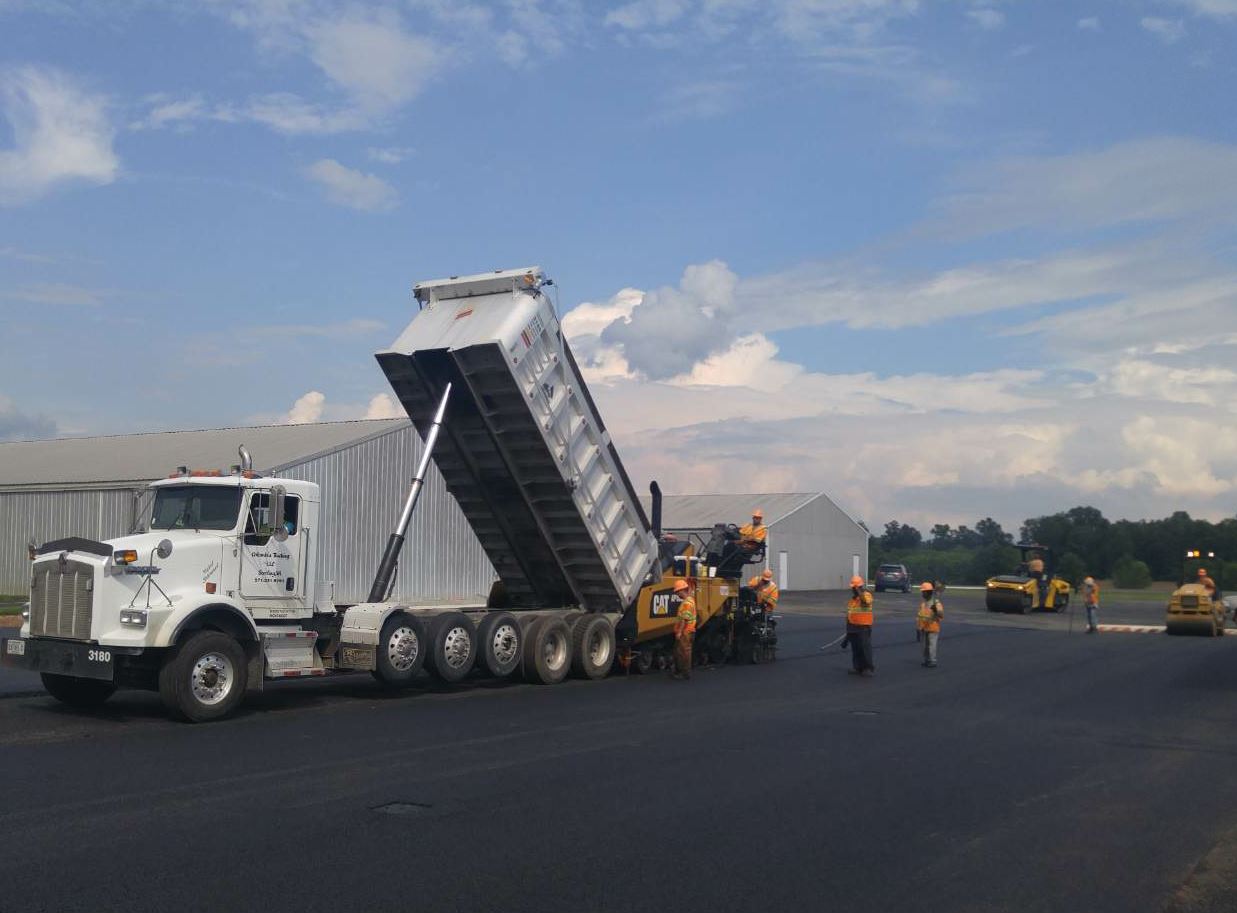
The Culpeper Airport porous pavement project won a Green Award from the Virginia Asphalt Association and is used in a STEM program for 5th grade children to learn how porous pavement works and benefits it provides with stormwater runoff. “The STEM program is done so we can show kids different pathways and career opportunities,” Dalrymple said.
Iseman has seen this first hand. Nearly everyone from the high school she attended went on to four-year universities. However, one former classmate didn’t complete his bachelor’s degree and instead became an electrical apprentice.
“He now owns his own business, has a second home at the beach, works part time and takes only the jobs he wants and passes the others to his staff,” she said. “Virginia has done an amazing job of shedding light on vocational schools and the jobs available without a four-year college education.”
“People are coming out of vocational schools and landing well-paying jobs that there isn’t much competition for, and they’re doing it without debt and with endless possibilities for upward mobility,” she added. “And asphalt is never going away. We’re never not going to have roads.”
And with innovative and enticing programs such as this one, Dalrymple hopes he’ll be always be able to find employees for future projects.
Germanna, VAA and VDOT Partner Up for Certification

Germanna Community College is not only a partner in the workforce development project with Chemung, but it is also involved in the Virginia Department of Transportation’s certification program, or VECAT, shown here.
Adjacent to the apprenticeship program, Germanna is also involved in the Virginia Department of Transportation’s certification program, or VECAT, required for all employees working on VDOT projects.
VDOT owns the certification, Germanna handles the organizational aspects like scheduling and payment, and Virginia Asphalt Association brings in the subject matter expertise, said VAA’s Director of Training and Development Carter Iseman.
“We basically all came together so we could spread this program across the state and meet the needs of industry members by providing classes to them either online or in their geographic areas,” Iseman said.
There is a classroom component available from January to April, and the online portion of the program is available year round. Both are followed by an exam that must be passed before working on any VDOT project. Each certification is valid for five years; then the employee must renew their certification.
Iseman said an average of 2500 people complete the certification either in person or online each year. However, the rules for re-certifying every five years were implemented just last year, so the numbers are expected to increase over time.
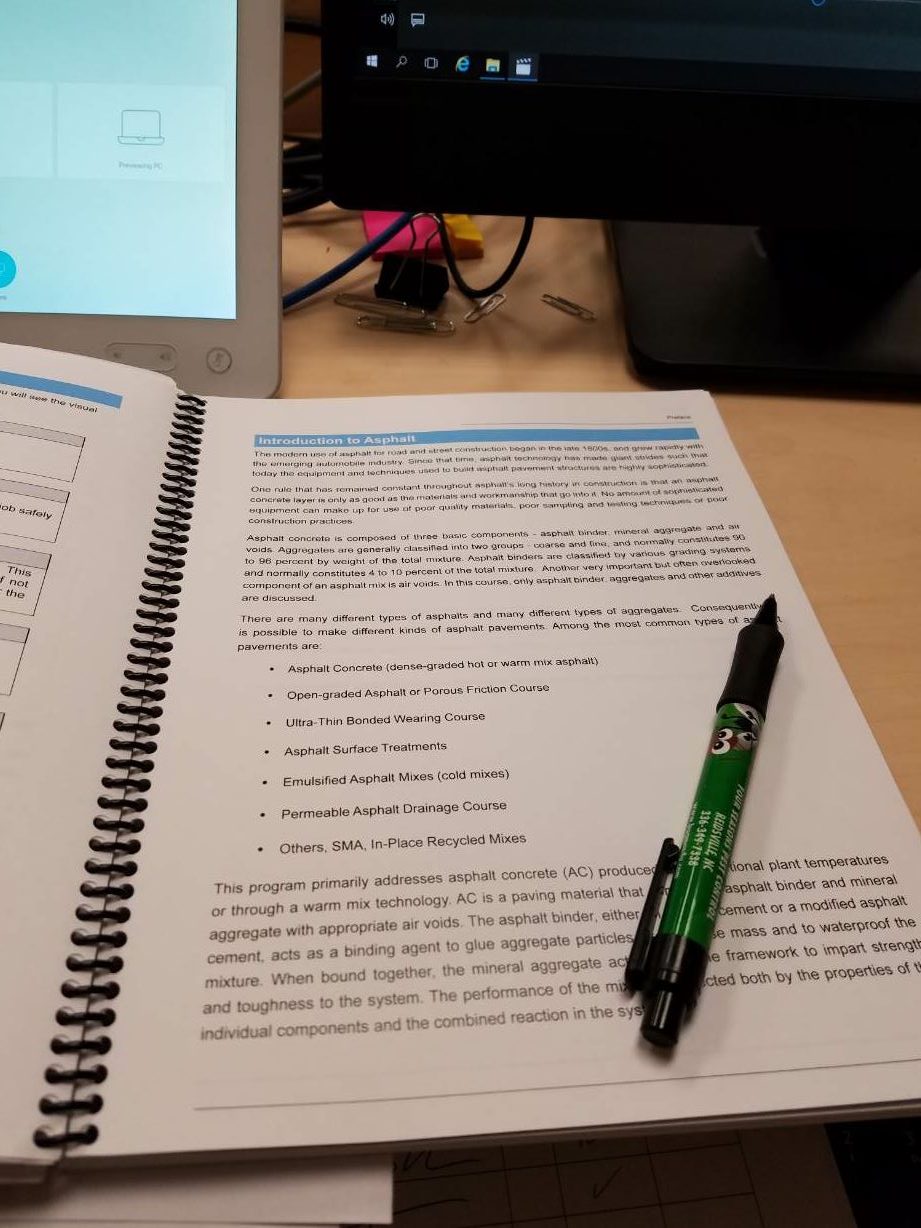
Field 1
The certification program includes 10 classes: field one and field two, plant one and plant two, mix design, slurry surfacing, surface treatments, and three cold recycling classes. The field courses are the most popular, followed by the plant courses and then mix design.
Field one covers work zone safety, surface preparation, mix delivery, required equipment, laydown operations, compaction, and common problems. In field two, students dig deeper into those topics and spend a great deal of time on density and various math calculations.
Plant one covers safety, plant equipment and operation, stockpile management, components of asphalt mixes and volumetrics. Plant two digs more into specific mixes and testing procedures.
Mix design, the most advanced class on offer, covers mix design opportunities, material properties, and evaluating trial blends.
“We’re now at the point that we have the basic fundamentals down and are looking for ways to expand our offerings,” Iseman said. “Our plan for the future is to expand into more specialized areas, perhaps a second level of mix design and soft skills like leadership management.”
Both the classroom and online courses are based on pre-recorded videos. However, in-person classes offer more opportunities to ask questions of the instructors, most of whom are retired VDOT employees.
“We’re very lucky to have subject matter experts who know this stuff inside and out,” Iseman said. Ninety-five percent of the staff involved are doing so on a volunteer basis
“These are people who are passionate about asphalt and have a shared goal of ensuring that people working on our road crews know what they’re doing and are bettering our state highway infrastructure,” Iseman said.
